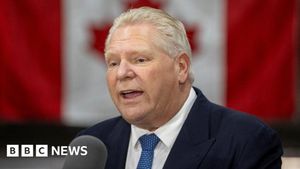U.S. Senator Brian Schatz has announced he will block the confirmation of President Donald Trump’s nominees for diplomatic positions due to concerns over the future of the U.S. Agency for International Development (USAID). This move arises from plans to shut down USAID and merge it with the State Department—a process Schatz views as detrimental to global humanitarian aid efforts.
Schatz, who hails from Hawaii, stated the blockade reflects his deep dissatisfaction with the Trump administration's approach to international assistance. Under the chamber’s rules, one senator can effectively hold up the nomination process, even if all other senators agree to move forward. This means the Senate could face extended debate over Trump’s nominees if Schatz persists with his plan.
Reports indicate the proposed changes to USAID would significantly diminish its capacity to deliver aid. Already, employees at the agency have been instructed to stay home, and there are alarming reports of hundreds, if not thousands, of staff having been removed from their posts. USAID, which has been instrumental in providing global assistance—including projects focused on women’s health, clean water access, energy security, and anti-corruption—accounts for 42% of all humanitarian aid tracked by the United Nations as of 2024.
Schatz's efforts follow public remarks from President Trump claiming billionaire Elon Musk has been assigned the task of cutting what he termed as wasteful spending within the agency. Musk’s involvement has raised eyebrows, particularly due to his lack of experience with government humanitarian initiatives. Critics argue his management style could disrupt established aid channels and contribute to unnecessary suffering abroad.
The tension surrounding USAID is palpable among congressional Democrats. At a press conference outside the agency, Schatz joined other party members to vocalize their concerns about what they believe is a direct assault on the agency responsible for funding billions of dollars’ worth of life-saving assistance worldwide. According to Schatz, "I will oppose unanimous consent. I will vote no. I will do maximal delays until this is resolved," signaling his intent to stall the confirmations until policy changes are addressed.
Senator Schatz is not the only Democrat willing to leverage the slow legislative process to express dissent against the administration’s actions. Senator Chris Van Hollen also indicated his intention to disrupt the flow of State Department nominees, expressing concern over the strategic reduction of USAID’s autonomy and its integration within the State Department’s broader bureaucratic structure.
This maneuver reflects the political environment faced by the minority party. Similar tactics have been employed by Republican senators who previously held up nominations during the Biden administration, focusing their retaliation on issues such as the Defense Department's abortion policy. By slowing down nominations or promotions, senators can exert pressure on the administration to reconsider its policy approaches.
With Schatz's intention made public, the dynamics concerning Trump’s foreign policy appointments face new uncertainties. If the Senate debates each nominee over extended periods, this could eliminate the momentum needed for the administration to establish its foreign policy team quickly. The political ramifications could significantly affect U.S. engagements with foreign allies and humanitarian partnerships worldwide.
Overall, Senator Schatz’s blockade serves as a reminder of the checks and balances inherent within the U.S. government system. With partisan divides growing more pronounced, strategies such as these are becoming increasingly common as lawmakers seek to protect established programs from perceived encroachment and defend necessary funding for international aid.
While the ultimate impact of this blockade remains to be seen, it undeniably showcases the struggles within the Senate as different factions contest the priorities of U.S. foreign aid and humanitarian efforts. The continuing conversations around the future of USAID will be pivotal—not just for the agency itself but for how the U.S. approaches global humanitarian crises moving forward.



